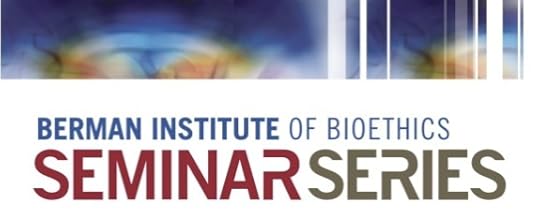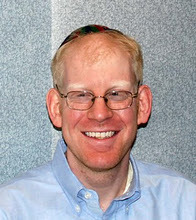Zackary Sholem Berger's Blog, page 36
February 22, 2012
"Encouraging Patient Autonomy: From Theory to Pr...

 "Encouraging Patient Autonomy: From Theory to Practice in Hospital and Clinic
"Encouraging Patient Autonomy: From Theory to Practice in Hospital and ClinicZack Berger, MD
Assistant Professor of Medicine
Johns Hopkins General Internal Medicine
Johns Hopkins University
Monday, February 27, 2012, 12:15pm – 1:30pm
615 N. Wolfe Street, W3008
Open to Everyone. Lunch will be providedClick here for a full list of upcoming seminars
February 21, 2012
Simple questions with complicated answers that people ask their doctors: a top 10
1. Should I take an aspirin?
2. Should I take a medication for osteoporosis?
3. How often should I get a DEXA scan?
4. Should I see a specialist about this?
5. What's the best test to keep me from getting cancer?
6. Can you write me a prescription for an antibiotic?
7. Can't I just get an MRI?
8. What's the difference between you and a family medicine doctor?
9. What diet can help me live longer?
10. Can't you just order me some baseline bloodwork?
And a bonus:
11. Why is your hospital better than any other?
February 16, 2012
Big blank sky
 I tipped the night over and poured it out
I tipped the night over and poured it out
near your pillow. Left a big blank sky.
Stars coming unstuck one by one
fall in your mint tea. Stay awake!
We'll rehang them all
I'll lift you up
You'll be Michelangelo
February 15, 2012
Avi Shafran says gay people can be cured, not surprisingly
Avi Shafran is very quick to assume he knows what the Torah view is and to characterize those who disagree with him as "nominally Orthodox." It is unclear what Shafran means with this charge and how close to the Agudah view one must hew to win the coveted Shafran Medal for Non-Nominal Orthodoxy. Unfortunately for this simplistic line of thinking, even Orthodoxy has changed through the centuries and the Aguda's view on Judaism is certainly not the only one even among halachically observant Jews.
With regard to so-called "reparative" therapy, Shafran cites (unnamed) "other mental health care professionals" (in the plural, yet!) who insists that "such interventions are…effective." I must have missed who these mental health professionals are (or perhaps they are only nominal?), what their qualifications might be, and what their evidence is for the effectiveness of so-called "reparative" therapy other than their insistence upon it. Let us add to the mix the "inconvenient" fact that some of these so-called "therapists" were in the employ of by-no-means-nominally fundamentalist, anti-gay organizations, and the picture starts to look more and more Shafranesque.
Shafran also claims that he has met "actual human beings who testify that the therapy has helped them realize their goal to live exclusively heterosexual lives." Unfortunately, the reports in the press that I have seen which go the trouble (as inconvenient as it might be) to figure out who these people are come to the conclusion that the vast majority are not, in fact, "cured" of homosexuality (as odious a term as that is). Shafran's just-so story of "dozens" of patients is not to be believed.
Finally, as usual, Shafran maintains that there is one "traditional Jewish view [sic!]" and that this is never informed by contemporary morality. This is just as false and pernicious as his anti-scientific claims about "reparative" therapy. The Ultra-Orthodox have their own morality born of their culture, and they are certainly welcome to it, but for Shafran to trot out the so-called "Torah basis" of this culture with every op-ed begins to pall. Or sicken.
February 13, 2012
Confessions of an e-skeptic
Many are the passionate e-vangelists regarding electronic health information and its centrality to patient-centered care. "Give me my damn data," is the slogan – and I cannot disagree. I am more than happy for everyone to have access to their notes, studies, blood tests. Let everyone if they want crawl into the innards of our health care system and root around.
But the people who can use this data, or can advocate for its release, are already the empowered ones.
My doubts are these:
First, the electronic health record can actually undermine patient-centeredness, and I assume patient-available health information can do the same thing. Information is not the most important basis of communication – emotions and relationships are.
Second, health IT can improve healthcare disparities, but it could just as easily become a reflection of them, or – worse – an extension of these disparities into new areas.
E-vangelism is a species of True Belief. There are always going to be patients who, for whatever reason, cannot get with the latest technological or reform program. We should be caring for those people first, because they are the most disadvantaged, generally the sickest, and certainly those who saddle our system with great cost. Let's make mobile health a tool for the triple aim, not the other way around.
February 9, 2012
Lack

Our lot is to lack little
and prod our sleepy guilt.
We count our money, ready
to bristle at our greed.
Do we have smaller bills?
Is stagnant cash our bile?
February 6, 2012
Catch me as catch can
Welcome all! If you are here for the first time (via link from Languagehat), look around, have a cup of tea, buy my book.
And, for regulars and first-timers alike:
I will be reading Yiddish poetry with the estimable Yermiayhu Ahron Taub, this coming Sunday at 7:30pm, at Tifereth Israel in Washington, DC. There will be much English and explication as well. Please come! (If you speak Facebook, you can RSVP there.)
I will also be giving a talk at the Johns Hopkins Berman Institute of Bioethics on February 27th, concerning the encouragement of patient autonomy in outpatient and inpatient settings. I believe this is open to the public, though you might have to get a guest pass at the entrance.
January 31, 2012
To read today
The first:
I have cared for several patients over the years whose palpable loneliness still shocks me. And this is not loneliness that 5 minutes of handholding or a visit from the volunteer dog can fix. This is institutionalized loneliness, refractory loneliness, the end stage of a life that has somehow not gone as planned. It is mixed with the memory of poor choices and their residual regret. I am sometimes witness to tragedy that I cannot define, diagnose, manage, or cure. I am increasingly aware of the tragedy of social isolation, but I have a hard time understanding it. The mechanism of disease—if one can call it that—is too overwhelming, too multifaceted. Social isolation is not a medical illness in the way that I was taught to think about illness, but it is often the ubiquitous fact that envelops every medical decision and even haunts the way I think about a patient's terminal illness.
I have never asked a patient why he or she and society had parted ways, but in quiet moments, I occasionally think about it. Sometimes clues present themselves: an offhand remark about an accident, a history of incarceration or drug abuse, or a financial dispute with a family member. Roman, however, did not offer many clues. The next-of-kin information in his chart was blank. He had a daughter, but they had not spoken in years. I don't know why. Sometimes it's better not to know—sometimes too much history can corrupt empathy.
So writes the Portland internist Devan Kansagara in an eloquent piece for Annals (usually "medical humanities" is not dignified by an actual human style). (This comes on the heels of a first-author systematic review in JAMA.)
The second:
Weaver holds an endowed chair as alumnae professor of English at Simmons College, editing and translating poetry and prose both into and from modern Mandarin. In 2004 and 2008, he organized international conferences of Chinese poets at Simmons, the first held outside China.
In a telling anecdote on the mindset of the average Baltimorean, he recalls family members refusing to believe that he could speak the language of Yao Ming. To which he replied: "How would you know that anything I said wasn't Chinese?"
The Oracle of East Baltimore, portrayed in Urbanite.
January 29, 2012
A great time in the Bronx? A great time in the Bronx!
At the table: Bella Schaechter-Gottesman, Shane Baker, Pinny Glauber, Itzik Gottesman, Hy Wolfe, Suzanne Katchko, Anthony Russell, et al.
I had a fantastic time today at the Sholem Aleichem Cultural Center in the Bronx, reading poetry in English and Yiddish (+ cookies/tea/book selling!/interpreting, or refusing to, the phrase "food of God") — all thanks to Itzik Gottesman et al. — and then hanging out at the house of Yiddish poet/songwriter Bella Schaechter-Gottesman. Extra bonus was the high-flying dinner/discussion thereafter with R' Pinny Glauber.
January 26, 2012
The flourishing autonomy paradigm
The autonomy paradigm continues to flourish, planted as it is in the fertile soil of American rights thinking, anchored as it is by roots that run deep in the structure of American law, tended as it is by legions of the faithful. That paradigm is sustained by the methodologically and substantively hyper-rationalistic assumption that autonomy is what people primarily and pervasively want and need. Correspondingly and crucially, the law of bioethics assumes its principal task is to remove impediments to the exercise of autonomy, that once those impediments are gone, people will naturally gather evidence about the risks and benefits of each medical choice, apply their values to that evidence, and reach a considered decision.
Carl Schneider, The Practice of Autonomy: Patients, Doctors, and Medical Decisions, p. 9.



